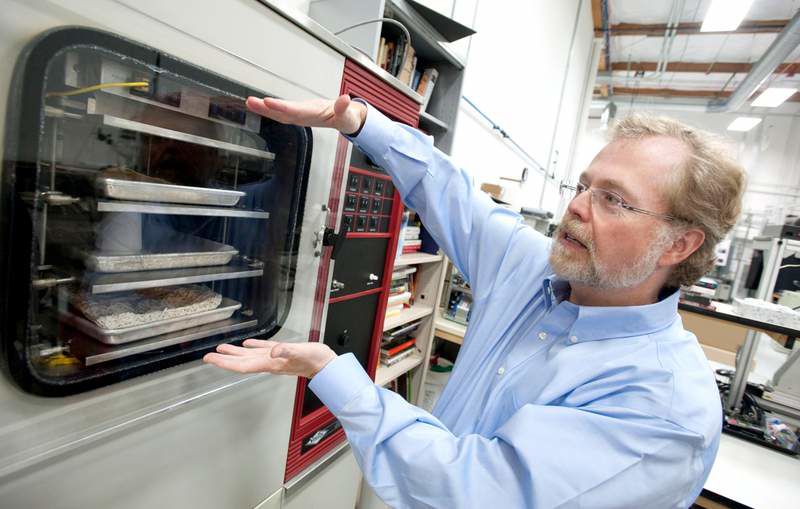Turning patents into ‘invention capital’
Published 4:00 am Thursday, February 18, 2010

- Nathan Myhrvold, chief of Intellectual Ventures, explains the workings of a machine that freeze-dries food. Myhrvold says patent holders are being treated unfairly.
BELLEVUE, Wash. — Nathan Myhrvold wants to shake up the marketplace for ideas. His mission and the activities of the company he heads, Intellectual Ventures, a secretive $5 billion investment firm that has scooped up 30,000 patents, inspire admiration and angst.
Admirers of Myhrvold, the scientist who led Microsoft’s technology development in the 1990s, see an innovator seeking to elevate the economic role and financial rewards for inventors whose patented ideas are often used without compensation by big technology companies. His detractors see a cynical operator deploying his bulging patent trove as a powerful bargaining chip, along with the implied threat of costly litigation, to prod high-tech companies to pay him lucrative fees. They call his company “Intellectual Vultures.”
White hat or black hat, Intellectual Ventures is growing rapidly and becoming a major force in the marketplace for intellectual capital. Its rise comes as Congress is considering legislation, championed by large technology companies, that would make it more difficult for patent holders to win large damage awards in court — changes that Myhrvold has opposed in congressional testimony and that his company has lobbied against.
Intellectual Ventures spent more than $1 million on lobbying last year, according to public filings compiled by OpenSecrets .org. In the three most recent election cycles — 2006, 2008 and 2010 — Intellectual Ventures executives, led by Myhrvold, have contributed more than $1 million to Democratic and Republican candidates and committees.
Myhrvold makes no apology for playing hard under the current patent system. If his company is going to help change things, it must be a force to be reckoned with. “We have to be successful,” he said.
The issues surrounding Intellectual Ventures, viewed broadly, are the ground rules and incentives for innovation. “How this plays out will be crucial to the American economy,” said Josh Lerner, an economist and patent expert at the Harvard Business School.
Myhrvold certainly thinks so. He says he is trying to build a robust, efficient market for “invention capital,” much as private equity and venture capital developed in recent decades. “They started from nothing, were deeply misunderstood and were trashed by people threatened by new business models,” he said in his offices here.
Myhrvold presents his case at length in a 7,000-word article published today in the Harvard Business Review. “If we and firms like us succeed,” he writes, “the invention capital system will turbocharge technological progress, create many more new businesses, and change the world for the better.”
In the article and in conversation, Myhrvold describes the patent world as a vastly underdeveloped market, starved for private capital and too dependent on federal financing for universities and government agencies, which is mainly aimed at scientific discovery anyway. Eventually, he foresees patents being valued as a separate asset class, like real estate or securities.
His antagonists, he says, are the “cozy oligarchy” of big technology companies like IBM, Hewlett-Packard and others that typically reach cross-licensing agreements with each other, and then refuse to deal with or acknowledge the work of inventors or smaller companies.
Ignoring the patents of others is “deeply ingrained in parts of certain industries,” he writes in the article, “most notably software, computing and other Internet-related sectors.”
Large technology companies complain about patent suits but, Myhrvold says, their actions often invite litigation. “The attitude of the big guys has been that unless you sue me or threaten to sue me, get lost,” he said in the interview. “I know, I was one of those guys.” Indeed, Myhrvold, 50, supplied his considerable brain power to Microsoft for 13 years, serving as chief technology officer until 2000.
His Intellectual Ventures is not simply a patent hedge fund. Its 650 employees include scientists and engineers, and it has an in-house invention effort and lab that last year applied for 450 patents. To date, the company has paid $315 million to individual inventors.
He calls patents “the next software,” noting that software did not become a market on its own until the 1980s, spurred by innovators and the enforcement of intellectual property laws. “I’m trying to get inventions that kind of respect as an economic entity,” he said. Yet while Myhrvold is saying one thing, his company’s main activity is quite another, according to Mark Bohannon, general counsel and senior vice president for public policy for the Software and Information Industry Association.
Intellectual Ventures, Bohannon says, is the largest of the category of firms that hold patents, but do not make products. Lawyers call such firms nonpracticing entities, NPEs, though they are often labeled as patent trolls. “Our concern is that it games the patent litigation system so it can extract licensing fees and investments from technology companies that create jobs, innovate and make products,” said Bohannon, whose trade association includes IBM, Google, Oracle, SAP and Adobe.






